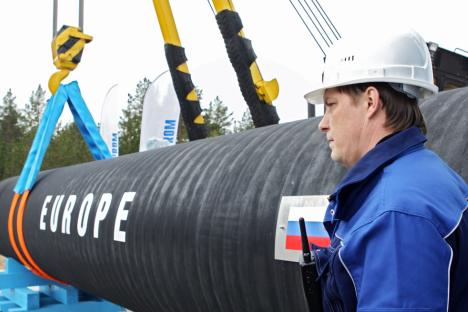The https://english.atlatszo.hu use cookies to track and profile customers such as action tags and pixel tracking on our website to assist our marketing. On our website we use technical, analytical, marketing and preference cookies. These are necessary for our site to work properly and to give us inforamation about how our site is used. See Cookies Policy
EP: Visegrad Quartet In Accord Over Gas Security
V4 MEPs are among the most influential in the EP when it comes to energy policy, according to Votewatch. The energy security regulation requires member states to help each other if one of them should run out of gas. In a crisis, priority of supplies is given to households, heating plants and institutions of special importance, such as hospitals and schools. The regulation will benefit the Visegrad countries which heavily rely on the import from Russia, extracting an insubstantial amount of gas themselves.
The project was led in the Commission by a Slovak, Maroš Šefčovič, and in the Parliament by a Pole, Jerzy Buzek, rapporteur, and chair of the Committee on Industry, Research and Energy.

During the last two years three Poles from three different factions, apart from Buzek, have prepared reports concerning the premises and regulations of the energy union – Marek Gróbarczyk (PiS, ECR), Adam Gierek (SLD-UP, S&D) and Zdzisław Krasnodębski (PiS, ECR). Hungarian MEP András Gyürk (Fidesz/KDNP, EPP) prepared a report on liquefied natural gas. The Czech Czech Miroslav Poche (ČSSD, S&D) has been very active on the issue as well.
Our other stories in this series about V4 countries
Poland and Hungary: The EU takes its time when it comes to punishing member states
Oligarchs and government control: Pressure on media mounts in V4 countries as the EU watches
In For a Penny, But Not For the Pound: V4 countries refusing to take in asylum seekers
From its very beginning, the energy union is an idea linked to Visegrad Countries. It was first proposed in 2014 by Donald Tusk together with other leaders of the region. Tusk wanted the EU to negotiate with the Kremlin purchasing gas as a joint buyer, a move that would strengthen the EU’s bargaining position.
An energy union would primarily benefit Poland and the Czech Republic, as these countries pay the highest rates in Europe for the Russian gas, higher than their richer neighbours to the West.
Divided by Putin
The V4 group is split over its attitude to Russia. Poland, Slovakia and the Czech Republic would like to put a stop to their dependency on Gazprom, while Budapest views Russia as a close partner. In May of 2017 works have begun to build a pipeline delivering Russian gas from Turkey to Hungary.
This comes after the failure of another project, a southern pipeline leading from Russia through the Black Sea onto the Balkans and then to Hungary.
Putin and Orban’s venture was blocked by EU regulations, introduced in 2010, saying that the gas extracting enterprise cannot control the transmission networks.
Another issue on which the Visegrad countries do not see eye to eye is NordStream 2. Poland and Slovakia are convinced that a northern pipeline is a dangerous solution that would let Russia use their gas for political strifes. But Hungary and the Czech Republic hope that this new connection would strengthen their role as countries of transit for the Russian gas.
Visegrad Against Green Energy
The V4 Group takes a common stand when it comes to the choices of energy sources. In Visegrad countries these are mostly coal and nuclear energy (only Poland has no nuclear plant), which makes them wary of the EU’s idea to force member states to transition to renewable fuels.
Almost all V4 MEPs, apart from the Czechs from S&D and Greens, voted against the clean energy package in the European Parliament. The Polish left-wing in the EP suggests that the EU should focus on enhancing energy efficiency and only then move on to substantial reforms in the member states.
Food and gas brings the V4 back to the table
The energy policy is becoming the V4 countries’ main area of cooperation. Earlier, they did manage to take a common stance against refugee relocations but antagonized the Commission and some member states, by refusing to come up with any solutions other than the nebulous “fighting the problem at its roots”.
Since then, the V4 countries changed their approach to more amicable (some, admittedly, more than others). In 2017, the group managed to successfully put the issue of food quality on the European agenda. In July, after a meeting on the subject with Slovak prime minister Robert Fico, Jean-Claude Juncker joked: “It’s the first time that a prime minister coming from the Visegrad four is asking the commission to have more competences.”
“It’s the first time that a prime minister coming from the Visegrad four is asking the commission to have more competences.”
The resolution on gas security marks the Visegrad group’s first major legislative success in recent years.
Written by Wojciech Gąsior
This text was created within the joint project of four organizations: Czech Kohovolit.eu, Slovakian Demagog.sk, Hungarian Atlatszo.hu and Polish MamPrawoWiedziec.pl. The project “Closer to V4 Policy” is funded by the Visegrad Fund. English editing: Helena Teleżyńska.
[sharedcontent slug=”hirdetes-english”]
Share:
Your support matters. Your donation helps us to uncover the truth.
- PayPal
- Bank transfer
- Patreon
- Benevity
Support our work with a PayPal donation to the Átlátszónet Foundation! Thank you.
Support our work by bank transfer to the account of the Átlátszónet Foundation. Please add in the comments: “Donation”
Beneficiary: Átlátszónet Alapítvány, bank name and address: Raiffeisen Bank, H-1054 Budapest, Akadémia utca 6.
EUR: IBAN HU36 1201 1265 0142 5189 0040 0002
USD: IBAN HU36 1201 1265 0142 5189 0050 0009
HUF: IBAN HU78 1201 1265 0142 5189 0030 0005
SWIFT: UBRTHUHB
Be a follower on Patreon
Support us on Benevity!


